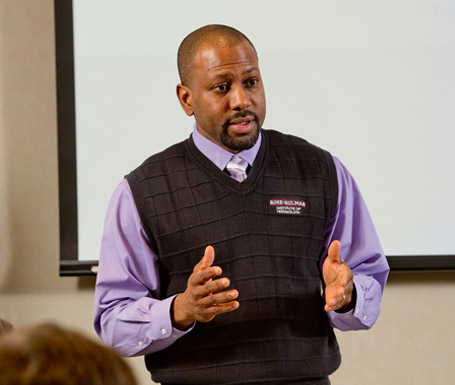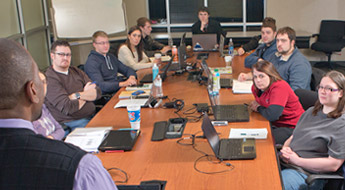The engineering management master's program facilitates students' educational experiences to distinguish themselves from other engineers in the workplace. Through various instruction modes and experiences, students develop leadership and technical skills to positively address the human (behavioral) and technical opportunities presented in today's global work environment. The goal is to provide students with discipline-free managerial, leadership, and technical skills that accentuate their undergraduate STEM degrees and elevate their career trajectories.
The department offers two variations of the master's degree: Master of Science in Engineering Management (MSEM) and Master of Engineering Management (MEM). The MSEM degree requires a combination of coursework and a capstone project, while the MEM degree does not require a capstone project but instead requires eight (8) additional credit hours of graduate-level coursework. Both degree programs require three (3) one-credit hour EMGT graduate seminars, which expose students to relevant engineering management topics and experts that they would not be exposed to in other classes.
Within the course offerings of engineering management, students can explore the areas of entrepreneurship, operations, Six Sigma, and systems engineering as they relate to the discipline.
Both degrees' objective is to prepare graduates for a diverse set of career opportunities in STEM fields or career advancement in their current field of study. We achieve these objectives by building upon their undergraduate training with advanced coursework and topics relevant to the engineering management discipline.
MSEM and MEM Graduate Student Learning Outcomes
Student Outcomes are statements that describe what students are expected to have by the time of graduation.
- Acquire and apply knowledge or skills to demonstrate an understanding of political, economic, social, technical, environmental, or legal (PESTEL) issues relevant to engineering management.
- Apply engineering or managerial knowledge to analyze organizational concerns or devise solutions utilizing appropriate qualitative or quantitative tools.
- Meet objectives or create value (for a project, process, or organization) through individual or collaborative effort.
Master of Science in Engineering Management (MSEM)
The MSEM degree curriculum includes eight credit hours of an integrated project for students who want to investigate business practices, managerial principles, and engineering concepts and their impact on organizational operations. Students will be able to engage in research related to the engineering management discipline. Course requirements for the MSEM degree include:
- 20 credit hours of technical courses
- 20 credit hours of managerial courses
- 8 credit hours of Integrated Project (2 credit hours for proposal and 6 credit hours for research)
- 3 credit hours of EMGT Graduate Seminar
There is some flexibility with the balance of credits between the technical (20 credits) and managerial (20 credits) areas. In consultation with your academic advisor and with approval from the Department Head, a student may be allowed to shift some credits between these two areas, weighting one area more than the other.
Master of Engineering Management (MEM)
The MEM degree is a course-based professional degree for students seeking an in-depth understanding of the engineering management discipline and its application to their undergraduate program of study. Like MSEM students, MEM degree seekers develop business acumen and management/leadership skills to solve the socio-technical demands of today's workplace. Course requirements for the MEM degree include:
- 20 credit hours of technical courses
- 20 credit hours of managerial courses
- 8 credit hours of graduate-level elective courses
- 3 credit hours of EMGT Graduate Seminar
There is some flexibility with the balance of credits between the technical (20 credits) and managerial (20 credits) areas. In consultation with your academic advisor, and with approval from the Department Head, a student may be allowed to shift some credits between these two areas, weighting one area more than the other.





